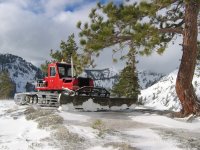kgracey
New member
Hey guys,
I know that pictures help keep the discussion going, so here's the first one. More will follow on Friday after I see the problem up close.
Today my friend was driving his 1983 LMC 3700 snowcat shown in the attached photo. He was moving some snow around in his parking area when the engine started to produce a click-click-click-clunk-clunk-clunk that got louder and louder.
Okay, so he turned the machine off. A local snowcat mechanic came by and said "let's move it to the garage". So they started it up and drove it about 10 feet before the engine siezed.
We don't know what's wrong, but it appears pretty serious. He and I have been getting by with pretty used machines and they've served us well.
Which brings me to the line of questions.
Does anybody know much about these engines, to take an educated guess about what went wrong?
If it's fatal, do you know where we could find a replacement Chalmers 200hp diesel used in this machine?
Thanks much!
Ken
I know that pictures help keep the discussion going, so here's the first one. More will follow on Friday after I see the problem up close.
Today my friend was driving his 1983 LMC 3700 snowcat shown in the attached photo. He was moving some snow around in his parking area when the engine started to produce a click-click-click-clunk-clunk-clunk that got louder and louder.
Okay, so he turned the machine off. A local snowcat mechanic came by and said "let's move it to the garage". So they started it up and drove it about 10 feet before the engine siezed.
We don't know what's wrong, but it appears pretty serious. He and I have been getting by with pretty used machines and they've served us well.
Which brings me to the line of questions.
Does anybody know much about these engines, to take an educated guess about what went wrong?
If it's fatal, do you know where we could find a replacement Chalmers 200hp diesel used in this machine?
Thanks much!
Ken









